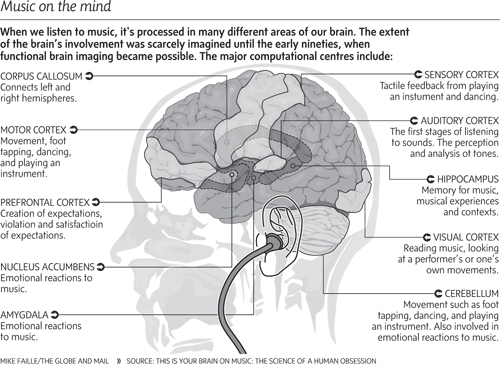How Does Music Affect The Brain?
As a musician, music seems to always put me under some sort of rush. You feel a connection to the music — whether you are just listening, or if you are the musician. The question is: what exactly is that connection? Let’s go past the emotional connection and dive into how music mentally affects your brain.
As shown in the diagram below, our brain develops music not in just one section, but divides into several individual sections. It is your mind that creates how we see the world. I’m not just talking about lyrics of songs, and their meaning. The subject goes beyond that.
Usually, we choose “happy music” or “sad music,” and we think that we choose this to express how we feel. Yet the truth is, our brain responds to music with our facial expressions. According to ScienceDirect, after hearing a short piece of music, participants were more likely to interpret a neutral expression as happy or sad, to match the tone of the music they heard.
Music can cure anxiety, depression, and desolation. It speaks to us, and actually describes our personality. We came across this post entitled 8 Surprising Ways Music Affects and Benefits our Brains, and it stated:
-
Blues fans have high self-esteem, are creative, outgoing, gentle and at ease
-
Jazz fans have high self-esteem, are creative, outgoing and at ease
-
Classical music fans have high self-esteem, are creative, introvert and at ease
-
Rap fans have high self-esteem and are outgoing
-
Opera fans have high self-esteem, are creative and gentle
-
Country and western fans are hardworking and outgoing
-
Reggae fans have high self-esteem, are creative, not hardworking, outgoing, gentle and at ease
-
Dance fans are creative and outgoing but not gentle
-
Indie fans have low self-esteem, are creative, not hard working, and not gentle
-
Bollywood fans are creative and outgoing
-
Rock/heavy metal fans have low self-esteem, are creative, not hard-working, not outgoing, gentle, and at ease
-
Chart pop fans have high self-esteem, are hard working, outgoing and gentle, but are not creative and not at ease
-
Soul fans have high self-esteem, are creative, outgoing, gentle, and at ease
So lets say that you look at someone’s Top 10 on their iPod. You would be able to predict someone’s personality from it. Not only can you predict someone’s personality, but moderate noise levels increase processing difficulty which promotes abstract processing, leading to higher creativity.
In 1911, an American researcher, Leonard Ayres, found that cyclists pedaled faster while listening to music than they did in silence. It turns out listening to music competes for our brain’s attention, and can help us to override those signals of fatigue. Though this is mostly beneficial for low- and moderate-intensity exercise. During high-intensity exercise, music isn’t as powerful at pulling our brain’s attention away from the pain of the workout.
So as it turns out- music influences our lives more than we think.


